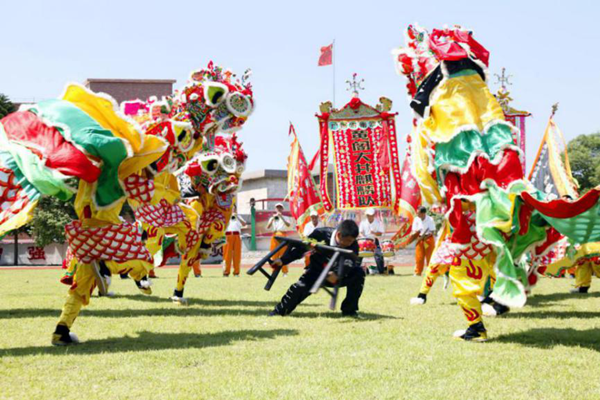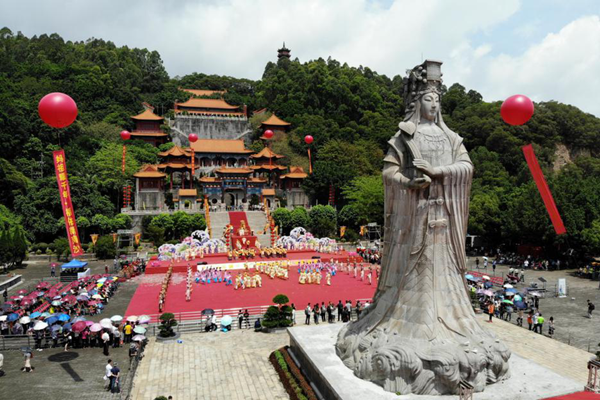Culture
Hengli Saltwater Song
The "Hengli Saltwater Song" is a Cantonese dialect fishing song sung by local residents to express their feelings about work and life. With cool and simple melodies, flexible forms, and rich and varied content, the song is often sung spontaneously. The lyrics also retain the local accent with a strong local color.
Nansha Wedding
Traditional wedding customs such as crossing the fire basin, not stepping on the threshold, and returning back to the bride's parents' home on the third day after the wedding still remain in Nansha. The difference is that at the wedding, the matchmaker, relatives and friends will sing the Saltwater Song to send the bride out with a happy blessing. To the sound of the suona horn, the bridegroom will take the bride to his home on his boat.
Huangge Qilin Dance (Kirin Dance)
Chinese qilin is one of the four most important mythical animals in Chinese legends.

Huangge Qilin Dance [Photo provided to chinadaily.com.cn]
The more than 100 years-old Huangge Qilin Dance is an ancient folk dance of Panyu Huangge Town in Guangzhou. The qilin dance is performed to pray for or welcome peace, good harvests, happiness and prosperity.
In 2007, the Huangge Qilin Dance was rated as a provincial intangible cultural heritage.
Birthday celebration for Tudigong
On the second day of the second lunar month every year, villagers in Xiadun natural village, Dagang town gather spontaneously and invite their relatives and friends for a large-scale banquet and celebration activity for the Tudigong (the earth god in Chinese folk religion) and Tudipo (the earth goddess in Chinese folk religion). On that day Xiadun natural village is shrouded in a peaceful festival atmosphere.
Birthday celebration of Tianhou
The festival is a traditional folk custom for celebrating the birthday of Tianhou, a Chinese sea goddess, in Nansha district.
Tianhou, known as Mazu, is a Chinese sea goddess. She is the deified form of the purported historical Lin Mo, whose life span is traditionally dated from 960 to 987. Clever and capable in water, she often helped boatmen and fishermen in distress. She was also able to forecast the weather to protect the safety of fishing boats and merchant ships. After her death, she was worshiped as the sea goddess and honored as Mazu.

Birthday celebration of Mazu, Chinese sea goddess [Photo provided to chinadaily.com.cn]
On the 23rd day of the 3rd month (birthday of Tianhou) and the 9th day of the 9th month (anniversary of the death of Tianhou) of the Chinese lunar calendar every year, Tianhou Palace holds grand celebration activities, attracting many visitors and believers for sightseeing and pilgrimage.
In 2009, the Mazu belief and customs were listed by UNESCO as a world intangible cultural heritage, which was China's first religious world heritage listing.
All rights reserved. Presented by China Daily









